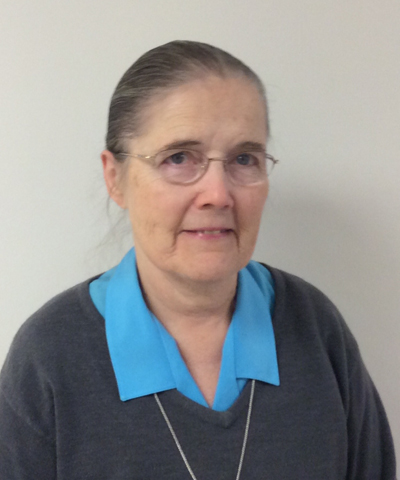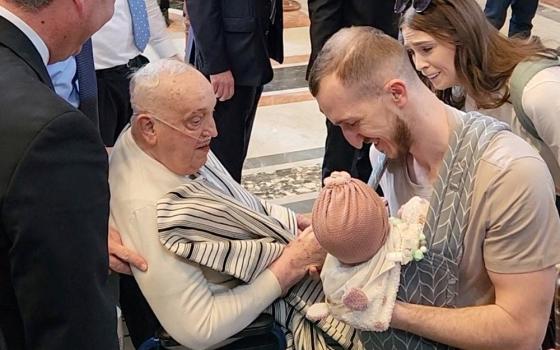
Mercy Sr. Mary Schmuck
Mercy Sr. Mary Schmuck
Age: 75.9
Who she is: Parish social ministry coordinator for the Nazareth Office of Catholic Charities of Louisville, Ky.
Lives in: Nazareth, Ky.
Sr. Camille: You have long applied your many gifts to programs sponsored by Catholic Charities. How would you describe your ministry with that agency?
Schmuck: I collaborate with our Catholic Charities of Louisville staff based in Louisville, Ky.
This office promotes parish social ministry, especially among 47 Catholic parishes in 19 Kentucky counties organized into four archdiocesan regions. Such ministry can be considered a three-leaf clover: charitable outreach, faithful citizenship, and global solidarity.
What do you think enables you to do this work well?
I have the ability to "herd kittens, track goldfish, and be like that smiling Energizer bunny."
What drew you to this work?
After I'd completed my time on our Sisters of Mercy Institute Justice Team, I sought a new ministry setting. A leader in the archdiocese of Louisville invited me to an interview for the position of parish social ministry coordinator with Catholic Charities of Louisville. The ministry fit very well with the call to respond to the five critical concerns identified by the Sisters of Mercy: sustaining Earth; walking in solidarity with immigrants; nonviolence; dismantling institutional racism; and the educational, health and spiritual needs of women.
Who are your collaborators?
Catholic Charities of Louisville staff, three staffers in particular.
Pastors of especially those 47 parishes.
Designated parish social ministry partners in some of those parishes.
Catholic Conference of Kentucky.
Kentucky Council of Churches Care for Creation working group.
St. Catharine College near Springfield, Ky., and Flaget Memorial Hospital and Bethlehem High School both in Bardstown, Ky.
Religious community contacts: Sister of Mercy, Sisters of Charity of Nazareth, Dominican Sisters for Peace, Loretto Community, Gethsemani Abbey, Ursuline Sisters.
What are its challenges?
While most understand and resonate with charitable outreach, promoting faithful citizenship is much harder, especially in the current national climate. As big as it is, global solidarity works pretty well given built-in annual connections with Catholic Relief Service and Catholic Campaign for Human Development. Given that everyone loves St. Francis of Assisi, the care for creation effort goes pretty well, whatever people think about changes in weather patterns.
This office tends a lot of follow-through on projects from our archdiocese, Catholic Conference of Kentucky, Catholic Climate Covenant, and USCCB public policy efforts. There are not enough hours in the week to tend rather simple efforts that could be very effective.
Unfortunately, so many people do not seem to know our precious treasure of Catholic social teaching, and some disagree with parts when they learn of it. We seem to have bought into a thesis that morality is only a personal or interpersonal matter; business knows best for all the rest.
What is it about your work that gives you satisfaction?
The faith of the people in this 206-year-old archdiocese is really wonderful in so many ways!
I'm grateful for the commitment of collaborators identified above. I have strong trust that what we do is indeed all God's work. As Archbishop Thomas McDonough noted in one of his pastoral letters, our troubles are all human caused, so if enough other human hands get together with hearts guided by God's love, we can make it all better.
What more would you like to achieve?
I'll be leaving this Catholic Charities ministry in June because of a health issue that slows me down, so getting things in good order for my successor is a major current objective. I'd like to reach more people with a spirit of hope that we can make things better among us if we work together in the spirit of our wonderful Catholic social teaching principles.
If much of your effort goes to help people with great financial and emotional needs, what do you learn from them? Can you identify an unexpected learning from a particular event?
Actually, I do very little direct work with people having great financial and emotional needs. Catholic Charities of Louisville services are based in Louisville, which is about 35 miles north of Nazareth. Instead I strive to work with our parish communities so that they can do that direct outreach and do it better, as well as promote wise public policy that helps/protects people who are poor and vulnerable in all of life's stages.
Where and with whom did you grow up?
I was born in Owensboro, Ky., the older of two children. I lived there for 12 years before we moved to Flaherty, Ky. I entered the Sisters of Mercy in Cincinnati when I was 21.
Did you have any role models or personal heroines?
I think I have a number of them -- friends, many sisters in our Mercy and other religious communities -- in how they've lived their lives, and have grown old, faithfully serving others so generously.
Where did you go to school?
Blessed Mother School in Owensboro. I currently live with the Sisters of Charity of Nazareth community and my fourth-grade teacher, Sr. Mary Patricia Brennan!
St. Aloysius School, Pewee Valley, Ky. (one and a half years), and Mercy Academy Louisville (three years). My schooling also included Flaherty High School, Ursuline College Louisville, Our Lady of Cincinnati College and Xavier University Cincinnati.
You certainly sampled many schools! How do you pray?
Daily Mass is a high priority for me, and I use our Mercy prayer book each day. I find the Stations of the Cross be so telling about life. I also draw from a collection of 50 prayers of mostly short length with powerful reminders for me and I pray the rosary irregularly.
What is your image of God?
A loving parent and friend.
Has it changed over time?
Yes, from a much harsher, perfectionist demander.
Can you say why?
The change comes from living longer and learning from good friends, classes, prayer and retreats.
What led you to become a Sister of Mercy?
I was so attracted by the down-to-earth goodness of the Sisters at Mt. Mercy, Mercy Academy.
What and who inspires you?
Again, lots of people who live with integrity and understanding of others.
This area of our archdiocese has at least three cultures: international/mobile, "Kentucky's Catholic Holy Land," and Southern Kentucky Missions. I've experienced real and deep faith across the variety! "We are indeed 'a big tent church,' " Fr. Brian Hehir rightly observes.
Can you share a story that makes you glad to be in your current ministry?
Almost every time I'm out among people giving a presentation. Whether alone or in collaboration with others, I find so many who grow in appreciation of our Catholic social teaching. They become aware of and interested in the contribution that our Catholic community is making to care for creation -- marrying environmental concern with great concern for people who are poor and vulnerable.
Where and with whom do you now live?
I live on Nazareth Motherhouse campus about 500 feet north of Bardstown, KY. Some 100 Sisters of Charity of Nazareth, with 140 other people and a fair number of deer, birds, squirrels, and 1,600 trees live on campus in this county (Nelson). It's one of three designated as Kentucky's Catholic Holy Land.
What ministries preceded your involvement with Catholic Charities?
I spent 12 years teaching high school math and chemistry. After that, I spent 10 years on our St. Catherine Convent Louisville staff with service on our province justice committee. I worked on the Louisville Council on Peacemaking and Religion, the archdiocesan Peace and Justice Commission, and as a member of NETWORK. During nine years on our Sisters of Mercy Institute Justice Team, I helped tend our nongovernmental status with the United Nations in New York City.
What is your favorite Scripture passage or Bible story?
The father's response to the return of his prodigal son.
Does it make in difference in your life?
I try not to take on the spirit of the brother of the prodigal son.
What about your faith is most meaningful to you?
The sacraments, especially the Eucharist -- food for the journey, "source and summit" of our whole faith, and so much else. I cherish the depth of our Catholic heritage over the millennia.
Where do you see it in action?
The faith of people in our Mercy community and in this archdiocese. It touches me to recognize our wrestling with being God's arms and legs, bringing God's compassionate mercy to those in need of it.
Who most influenced your belief system? Please explain.
My mother, through her attendance at daily Mass and her faithfulness to prayer, especially amid hardships. I learned from my dad's hard work, being a "straight shooter." I admired my brother's good nature with everyone. And my faith grew under the inspiration offered by teachers and retreat masters over the decades.
What do you consider your greatest accomplishment?
Getting almost to age 76. Others recognize my ability to witness to justice for all and to offer compassionate understanding.
I took great satisfaction in helping plan and implement our first Sisters of Mercy international justice conference at our Mercy International Centre in Dublin.
What in contemporary Catholicism or distresses you?
Stereotyping people and groups, sometimes demonizing them, misrepresenting what they are saying. I'm also saddened by the way ordinary people attribute to media the quality of near infallibility vs. faithfully and respectfully thinking things through together and going back to sources.
Is there anything you would change?
I'd like it if more would learn and embrace the conviction that there is morality guiding our life together in society, building on personal and interpersonal morality.
What causes you sorrow?
Evidence of disrespect and stereotyping that hurts individuals. I am saddened by the damaged creation we're leaving future generations. I regret another kind of damage: that which big, increasingly unregulated and undisclosed money is doing to what is left of our representative democracy.
What causes you joy?
The goodness of so many people, the beauty of creation.
What gives you hope?
We are about God's work; God is in charge, whatever else it seems.
How do you relax?
I enjoy writing notes and letters, listening to good instrumental music and watching some TV programs. Getting a grip on the "big picture" offers some relief.
Is there something you wish I had asked?
I'd like to share my fondness for my favorite saint: Francis of Assisi.
Like my mother, I pray the Stations of the Cross daily, and I pray for all Franciscans past and present.
In central Kentucky, avoiding deer on the roads is a big and necessary task. I've asked St. Francis to help me with that, then later added the requests be free of accidents and illness, which has seemed to become an exercise in one-way contracting!
St. Francis is a wonderful brother. If we would take on his spirit about God's gift of creation and care for poor and vulnerable people, we would make great strides in addressing our big care for creation issues currently and into the future!
Finally, I believe the communion of saints is very, very real.
And, Mary, so are you. Thanks for sharing your life with us.
[Mercy Sr. Camille D'Arienzo, broadcaster and author, narrates Stories of Forgiveness, a book about people whose experiences have caused them to consider the possibilities of extending or accepting forgiveness. The audiobook, renamed Forgiveness: Stories of Redemption, is available from Now You Know Media.]
Editor's note: We can send you an email alert every time Sr. Camille's column, Conversations with Sr. Camille, is posted. Go to this page and follow directions: Email alert signup.




